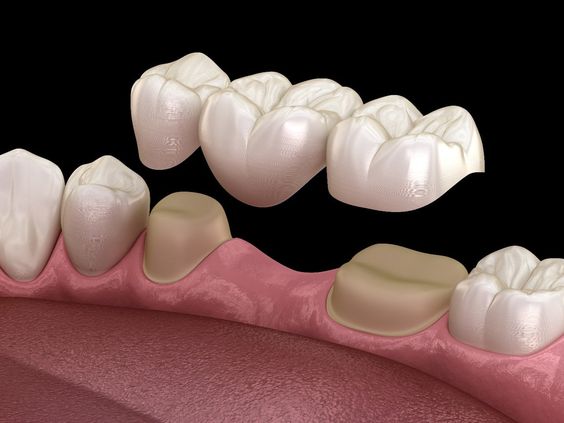For More Information on Reviews Visit Our Clinic Profile

Dental bridges are prosthetic devices used to replace one or more missing teeth. They bridge the gap created by missing teeth and are anchored to the adjacent natural teeth or dental implants.
Types of Dental Bridges
Traditional Bridges
Cantilever Bridges
- Most common type.
- Involves crowns placed on adjacent natural teeth or implants to support the pontic.
- Used when only one natural tooth is available for support.
- Less common and may not be suitable for back teeth.
Maryland Bridges
Implant-Supported Bridges
- Supported by a metal or porcelain framework bonded to the back of adjacent teeth.
- Less invasive as they don’t require crowns.
- Anchored using dental implants instead of natural teeth.
- Highly durable and ideal for multiple missing teeth.
When Should You Consider Dental Bridges ?
- You have one or more missing teeth causing functional issues.
- There is difficulty chewing or speaking due to gaps.
- You want to prevent remaining teeth from shifting.
- You wish to restore your smile and improve facial aesthetics.
What to Expect During the Procedure
Initial Consultation:
- Examination and imaging to assess the gap and surrounding teeth.
- Treatment plan and type of bridge recommended.
Preparation of Abutment Teeth:
- Adjacent teeth are reshaped and prepared for crowns.
- Impressions are taken for bridge fabrication.
Temporary Bridge Placement:
- A temporary bridge is placed while the permanent one is made.
Final Bridge Placement:
- The permanent bridge is adjusted and cemented.
- Implant-supported bridges may require multiple appointments if implants are needed.
Post-Treatment Care
- Maintain Oral Hygiene: Brush twice daily and floss under the bridge using a floss threader or water flosser.
- Regular Dental Check-ups: Visit your dentist for routine cleanings and examinations.
- Avoid Hard Foods: Prevent damage by avoiding sticky or hard foods.
- Use Mouthwash: Keep the area clean to prevent gum disease.
Why Should You Opt for Dental Crowns ?
- Restores Functionality: Enables proper chewing and speaking.
- Improves Aesthetics: Enhances your smile and facial structure.
- Prevents Teeth Shifting: Keeps remaining teeth in place.
- Boosts Confidence: Restores self-esteem with a natural-looking solution.

